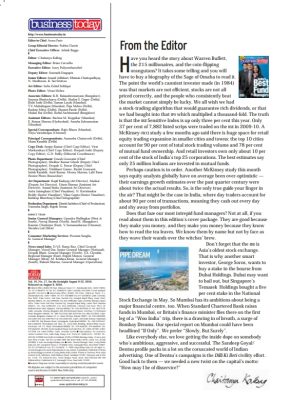India’s Best Fund Manager
[Business Today]
Published date: 22nd Aug 2010
Have you heard the story about Warren Buffett, the 215 millionaires, and the coin-flipping orangutans? It takes some telling and you will have to buy a biography of the Sage of Omaha to read it. The point the world’s canniest investor made (in 1984) was that markets are not efficient, stocks are not all priced correctly, and the people who consistently beat the market cannot simply be lucky. We all wish we had a stock-trading algorithm that would guarantee rich dividends, or that we had bought into that IPO which multiplied a thousand-fold. The truth is that the BSE Sensitive Index is up only three per cent this year. Only 37 per cent of 7,882 listed scrips were traded on the BSE in 2009-10. A McKinsey-FICCI study a few months ago said there is huge space for retail equity trading expansion in smaller cities and towns: the top 10 cities account for 90 per cent of total stock trading volume and 78 per cent of mutual fund ownership. And retail investors own only about 10 рег cent of the stock of India’s top 25 corporations. The best estimates say only 25 million Indians are invested in mutual funds.
Perhaps caution is in order. Another McKinsey study this month says equity analysts globally have on average been over-optimistic their earnings growth estimates over the past quarter century were about twice the actual results. So, is the only true guide your finger in the air? That might be the case in India, where day traders account for about 90 per cent of transactions, meaning they cash out every day and shy away from portfolios.
Does that faze our most intrepid fund managers? Not at all, if you read about them in this edition’s cover package. They are good because they make you money, and they make you money because they know how to read the tea leaves. We know them by name but not by face as they wave their wands over the witches’ brew.
Don’t forget that the BSE is Asia’s oldest stock exchange. That is why another smart investor, George Soros, wants to buy a stake in the bourse from Dubai Holdings. Dubai may want to bail out, but Singapore’s Temasek Holdings bought a five per cent stake in the National Stock Exchange in May. So Mumbai has its ambitions about being a major financial centre, too. When Standard Chartered Bank raises funds in Mumbai, or Britain’s finance minister flies there on the first leg of a “Woo India” trip, there is a drawing in of breath, a surge of Bombay Dreams. Our special report on Mumbai could have been headlined “If Only”. We prefer “Slowly, But Surely”.
Like everybody else, we love getting the inside dope on somebody who’s ambitious, aggressive, and successful. The Sandeep Goyal/ Dentsu profile packs in a lot on the coruscated world of Indian advertising. One of Dentsu’s campaigns is the Dilli Ki Beti civility effort. Good luck to them we needed a new twist on the capital’s motto:
“How may I be of disservice?”






